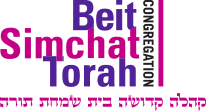
Staying Engaged, Forever
תּוֹרָ֥ה צִוָּה־לָ֖נוּ מֹשֶׁ֑ה מוֹרָשָׁ֖ה קְהִלַּ֥ת יַעֲקֹֽב׃
The Torah that Moses commanded us is the heritage of the Congregation of Jacob.
Deuteronomy 33:4
Milestones, while convenient for marking dates on calendars, are not what make our lives meaningful. Though our lives can be broken down to the “befores” and “afters” of major achievements, what makes us who we are, and truly defines our time here on earth, is the culmination of all of our choices – big and small alike – particularly those that affect other people.
The Talmud[1] relates several instances when Rebbe Yehuda HaNassi, the author of the Mishnah, cried out: “בכה רבי ואמר יש קונה עולמו בשעה אחת ויש קונה עולמו בכמה שנים – there are some people who acquire the World to Come in one moment, and there are others who acquire it over many years.” Although these paths are presented as mutually exclusive, perhaps the text should be read as an expectation to combine them together: if it is possible to acquire the World to Come in one moment, what then is attainable if one works hard in every moment?!
Rebbe Yehuda’s colleague, Rabbi Yakov of Korshie, similarly taught: “יָפָה שָׁעָה אַחַת בִּתְשׁוּבָה וּמַעֲשִׂים טוֹבִים בָּעוֹלָם הַזֶּה, מִכָּל חַיֵּי הָעוֹלָם הַבָּא – one hour of repentance and good deeds in this world, is more precious than all the life of the World to Come.”[2] Rebbe Yehuda continues “ואמר רבי לא דיין לבעלי תשובה שמקבלין אותן אלא שקורין אותן רבי – Not only are penitents accepted, but they are even called ‘Rabbi.’”[3] When we invest our time in doing the right thing, our actions also function as a model for others to follow.
Moses is paradigmatic of this principle. While it is true that Moses was a son, brother, husband, and father, to us he is Moshe Rabeinu – Moses our Teacher. His name appears 611 times in the Torah,[4] corresponding to the 611 mitzvot he gave to the Jewish People,[5] which is alluded to in the numerical value of the word “Torah – תורה” equalling 611.
Acknowledging Moses’ connection to the Torah is the first lesson that a child is meant to be taught.[6] Rav Hamnunah instructed parents to teach their children “תּוֹרָ֥ה צִוָּה־לָ֖נוּ מֹשֶׁ֑ה מוֹרָשָׁ֖ה קְהִלַּ֥ת יַעֲקֹֽב – The Torah that Moses commanded us is the heritage of the Congregation of Jacob,” as soon as they are able to speak.
Seeing the Torah as an inheritance ostensibly frames our relationship to it as one of passive acceptance. Instilling the privilege that no effort is required to receive this gift from our ancestors, as the introduction to a Jewish education, seems like a strange first instruction.
In a dramatic departure from the literal meaning, Rebbe Chiyah directs us instead to read the word “מוֹרָשָׁה – morasha” not as “inheritance” but as “מְאוֹרָסָה – meorasa” meaning “betrothed.”[7] The verse should then be understood as: “The Torah that Moses commanded us is the bride of Congregation of Jacob.”
Framing our relationship to the Torah as the person we are going to marry, as opposed to the one we have already married, acknowledges that there is still work for us to do. It positions us to approach the text and tradition with a humble curiosity, as we would at the beginning of any relationship, while encouraging us to contribute to the dialectic.
Perpetuating a sustainable intimacy, without losing the excitement and passion of the newness, requires a renewal of presence. King David offers a prayer to this effect in Psalms 27[8] “שִׁבְתִּ֣י בְּבֵית־יְ֭הוָה כָּל־יְמֵ֣י חַיַּ֑י לַחֲז֥וֹת בְּנֹֽעַם־יְ֝הוָ֗ה וּלְבַקֵּ֥ר בְּהֵיכָלֽוֹ – Would that I dwell in the House of Hashem all the days of my life, to behold the delight of Hashem and to visit God’s Sanctuary.”[9] Obtaining a permanent residence, while experiencing the benefits of a visitor, is really having the best of both worlds.
The Torah is infinite and eternal, so the process of acquiring it takes a deep commitment. In the sixth and final chapter of Ethics of Our Ancestors,[10] known as “קינן תורה – the 48 ways of acquiring Torah” concludes with: “וְהָאוֹמֵר דָּבָר בְּשֵׁם אוֹמְרוֹ, הָא לָמַדְתָּ שֶׁכָּל הָאוֹמֵר דָּבָר בְּשֵׁם אוֹמְרוֹ מֵבִיא גְאֻלָּה לָעוֹלָם, שֶׁנֶּאֱמַר וַתֹּאמֶר אֶסְתֵּר לַמֶּלֶךְ בְּשֵׁם מָרְדֳּכָי – Whoever repeats a thing in the name of the one who said it brings redemption to the world, as it is said: And Esther said to the king in the name of Mordechai.”[11]
Tradition places tremendous importance on providing proper attribution to the source of an idea. On one level we can understand that improperly citing the origin of a teaching minimizes the context and isn’t particularly respectful to its originator. However, redemption isn’t being held back because of a lack of footnotes. When the essential aspects of a person are reflected in their teaching, that person is inextricably connected to that wisdom. Repeating Torah in the name of the one who contributed it helps remind us of our responsibility to advance the same cause of goodness by offering up our best thoughts and actions.
The Hebrew word “קינן – kinyan – acquire” has a numerical value of 210, the same as “חבר – chaver”, and alludes to the attachment that one makes in the process of becoming one with the Torah they are internalizing. As we finish the annual cycle of reading the “The Torah that Moses commanded us”, and begin it yet again, may we merit to fulfill the words of the Prophet Hosea[12] that many say while wrapping the leather straps of the phylacteries around the ring finger: וְאֵרַשְׂתִּ֥יךְ לִ֖י לְעוֹלָ֑ם וְאֵרַשְׂתִּ֥יךְ לִי֙ בְּצֶ֣דֶק וּבְמִשְׁפָּ֔ט וּבְחֶ֖סֶד וּֽבְרַחֲמִֽים – And I will be engaged to you forever, and I will be engaged with you with righteousness and justice, and with goodness and mercy.
[1] Talmud Avodah Zarah 10b.
[2] Avos 4:17.
[3] Talmud Avodah Zarah 17a. See the story there for context.
[4] Meir Eynie Chachamin.
[5] Talmud Makkot 23b. – although there are 613 biblical commandments, the first two of the Ten Commandments were given directly by God.
[6] Talmud Sukkah 42a.
[7] Talmud Pesachim 49b ״תּוֹרָה צִוָּה לָנוּ מֹשֶׁה מוֹרָשָׁה״. אַל תִּקְרֵי: ״מוֹרָשָׁה״, אֶלָּא: מְאוֹרָסָה.
[8] Verse 4.
[9] See Otzrot Pennine HaTorah in the name of רב כהנמן זצ”ל.
[10] Avos 6:6.
[11] Esther 2:22.
[12] Hosea 2:21.
